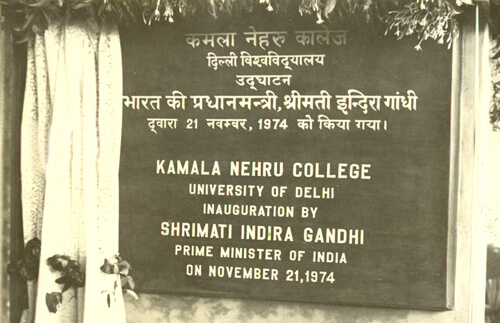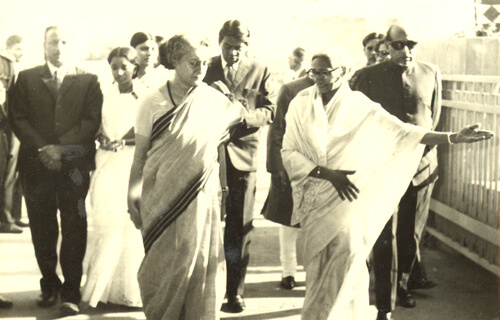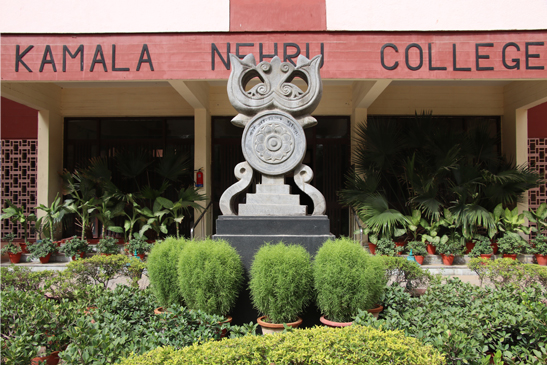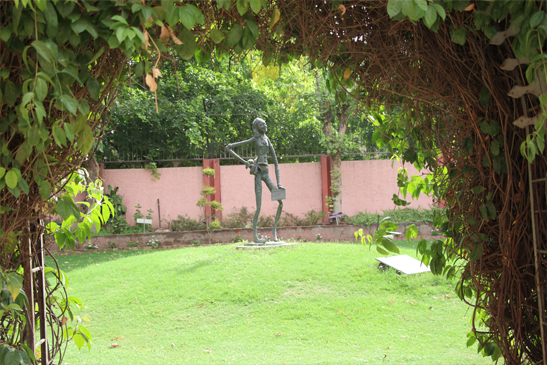













Smt. Kamala Nehru was a flame that flickered briefly during the raging storm of the freedom movement in India but left the imprints for generations to follow. Her contribution as an individual is not known to everyone. During the freedom struggle, she braved lathi-charges, organised processions, addressed meetings and led picketing of liquor and foreign cloth shops. She had to languish in the prison for days for the cause of India’s independence. Her personality had a major influence on her husband Jawaharlal Nehru and she stood by him in his determination to plunge into the movement started by Mahatma Gandhi so that India could be free from the clutches of the British rule.
While her husband was sent to the prison for days and months, Kamala Nehru put all her energies into social work. To begin with, she instituted a hospital in Swaraj Bhawan (Nehru’s family mansion) to treat freedom fighters and others wounded due to severe lathi charges. She persuaded women to come out of their homes and join the freedom struggle movement. Her determination for the empowerment of women pushed her to work for the education of women and encourage them to get rid of the old custom of purdah which was a prevalent practice in Rajasthan and other parts of North India at that time. She represented the modern woman with a free will at a time when women were not allowed in public places.
As a member of the Rashthriya Stree Sabha which was set up in 1921, Kamala Nehru worked for the entry of Dalits into temples. She was the first among the group of volunteers to sell contraband salt during the Salt Satyagraha. During the year 1930, Kamala Nehru led Desh Sevika Sangh along with Kasturba Gandhi and Sarojini Naidu and took up the challenging task of policing the disturbed areas of Bombay. While most men fighting for the freedom of the country were behind the bars, Kamala Nehru took up the task of organizing the work related to the freedom movement in her own ways. She was also the President of the Allahabad District Congress.
By the end of 1931, Kamala Nehru’s health started deteriorating and she passed away suffering from tuberculosis at the age of 37 in Switzerland. This was the end of the life of Smt. Kamala Nehru who left a legacy of determination and courage for women to follow. The life of Smt. Kamala Nehru instils the spirit of hard work, determination and a sense of pride in every student who becomes a part of Kamala Nehru College. The very name of the courageous Kamala Nehru encourages the young women of the college to confidently march ahead against all odds in life towards knowledge and freedom.
Kamala Nehru College was established on 20th July, 1964. At that time, it was known as ‘Government College for Women’ and was located in Defence Colony. The College initially offered courses only in humanities but later the commerce stream was added. The college began the early years of its journey under the guidance of the founder Principal Dr. K. K. Gorowara. When the college was started, it only had sixsteen staff members and 209 students passed out in the first batch in 1968. The College Magazine ‘Swati’ was launched in the academic year 1965-66. In 1966-67, the College was renamed as ‘Modern College for Women’ and in 1967-68 the College Magazine acquired a new name ‘Apoorva’. On 21st November 1972, the foundation stone for a new building was laid at Hauz Khas (at present August Kranti Marg) by then President Shri V.V.Giri. The college was given a new name and it became Kamala Nehru College. In 1974, on the occasion of Founder’s Day, Mrs. Indira Gandhi visited the new building, unveiled the plaque and planted saplings.
The college has a beautiful auditorium which was built through sincere contribution made by the staff and students through fund raising campaigns. It was inaugurated on 17th December, 1991 by the then Vice-President Shankar Dayal Sharma. Today, the college has well maintained computer laboratories, sports ground, gymnasium and eco-friendly classrooms (bamboo rooms apart from the main building). The library is well stacked and has a separate audio visual section. The college is differently-abled friendly and is under constant CCTV surveillance. The Placement Cell, NSS, NSO, NCC and Counselling Cell function for the overall wellbeing of the students. Kamala Nehru College has several extra-curricular societies that cover the whole gamut of personality development aspects by providing plural avenues to students for self-discovery. All departments and the societies have their annual newsletters/magazines and the college comes up with its journal ‘Akademos’ (An Annual Miscellany ofo Liberal Arts and Scholarship, ISSN 2231-0584) each year.
Any educational institute advances on account of its efficient faculty members, diligent students, supportive administrative staff and a dynamic Principal. Kamala Nehru College has been constantly advancing on account of the efforts of all these factors. The founder principal Dr. K. K. Gorowara (21-7-1964 to 10-7-1986), with her idealism and vision gave the direction to the college and laid the foundation of everything that an educational institute needs. Her dedicated work shaped the former years of the college. She played a pivotal role in helping college forge ahead and carve a niche for itself in various domains. The college owes a lot to her for giving the name and place to Kamala Nehru College in the University of Delhi.
The second Principal Dr. Surinder J. Sharma (23-9-1986 to 31-7-2004) took forward the legacy of Dr .K. K Gorowara and brought in remarkable changes as per the need of the time which helped college rise in newer directions. It is her relentless endeavours that brought in new courses such as Commerce, Geography, Sociology, Journalism and gave a new face to the college making way for infrastructural development and producing high calibre students emerging in all walks of life. Her encouraging work for the growth of the institute will remain unforgettable.
The third Principal Dr. Minoti Chatterjee (1-11-2004 to 31-08-2015) carried forward the tradition of the college and worked hard to bring about a beautiful amalgam of academic and extracurricular excellence. Being a cultural impresario herself, she ensured that the students got a taste of the tradition and culture of the country as a part of their academic exercise. All her efforts were towards value creating education, empowerment and employability of the young women of the college. During her tenure, Kamala Nehru College made collaborations with universities abroad on both academic and cultural fronts and ushered in the Golden Jubilee Year 2014, carrying in earnest the very spirit of Smt. Kamala Nehru, with a greater vision of producing more confident, dignified and responsible young citizens. The longstanding commitment of the college towards excellence was rewarded in the form of an ‘A’ grade (CGPA 3.33) by the National Assessment and Accreditation Council in 2016 under the able guidance of the then officiating Principal Dr. Rita Malhotra (September 2015 - December 2016).
Today the college stands tall as one of the best ‘All Women College’ in the south campus of University of Delhi striving sincerely to shine on all fronts—be it academics, culture and sports.


